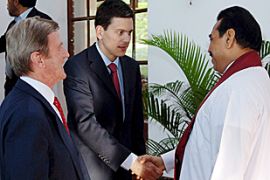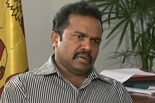Sri Lanka rejects EU call for truce
UK and French foreign ministers visit war zone in bid to facilitate flow of humanitarian aid.

The UN estimates that up to 50,000 civilians are trapped in the fighting along the island’s northeast coast.
For civilians’ sake
Miliband said that international calls for a ceasefire were “only to save civilians” and not to help the LTTE, whose leader V Prabhakaran is making his last stand against the Sri Lankan military.
| In depth |
|
|
“No one in the international community has been calling for a ceasefire or to stop firing to save Prabhakaran,” Miliband said.
“The calls have come because of the overwhelming concern with the well-being of the civilians.”
According to the UN as many as 6,500 civilians may have been killed and another 14,000 wounded in the government’s offensive against the LTTE so far this year.
Mahinda Rajapakse, Sri Lanka’s president, pledged two days ago that air raids and attacks using heavy-calibre weapons would stop, but ground attacks have continued.
The LTTE accused the military of killing at least 11 people in the war zone on Tuesday, which the government denied.
David Chater, reporting for Al Jazeera, had predicted that the European foreign ministers would not be successful in persuading the Sri Lankan government.
“They are asking for a humanitarian pause so that aid agencies and supplies can get through to some 50,000 civilians who are believed to be trapped in appalling conditions inside the combat zone,” he said.
“But I think they will get exactly the same answer the UN did – that there will be no pause, that this rescue hostage mission will continue but as the Sri Lankan government always say – it is their war and they will continue to fight it.”
Visiting camps
John Holmes, the UN’s most senior humanitarian official, left Sri Lanka earlier this week having failed to secure greater access for relief agencies.
| Focus: Sri Lanka | ||||||||||

|
Kouchner and Miliband travelled to Internally Displaced Persons’ camps in the north which have been overrun in recent days by more than 100,000 war refugees.
After months of heavy fighting, the military says the LTTE is down to its last few hundred fighters.
The government has blocked most aid agencies from working in the north, and has put civilians who are escaping the fighting into camps guarded by the military.
Aid workers who have visited the camps have testified to food shortages, lack of sanitation, a desperate medical situation and chronic overcrowding.
Although the LTTE has been condemned for using civilians as human shields, the UN says both sides in the conflict may be guilty of war crimes.

